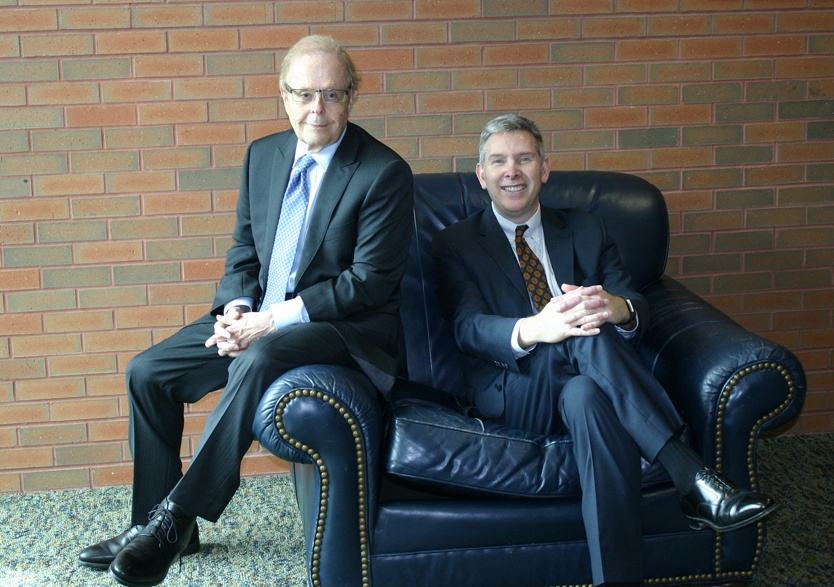
Joe Kimble was working as a staff analyst for the Michigan Supreme Court in the mid-1970s when he was faced with an assignment that he wasn’t quite sure how to tackle: revising Michigan court rules.
He had majored in literature at Amherst College before going to law school at the University of Michigan and even earned a few student writing awards along the way, but legal writing was something he’d yet to master. So before putting pen to paper, he decided to educate himself. He went to the law library and checked out The Fundamentals of Legal Drafting by Reed Dickerson, which at the time appeared to be the one and only book on the subject.
“It never quite hit me in law school, even with that kind of background, that there’s something wrong with the way lawyers write,” he said. “As many law students do, I just took it as a given that this is the way it is, and this is the way it has to be.”
Dickerson showed Kimble the light. He still remembers a particularly eye-opening part of the book, laid out in two easy-to-read columns. One listed common legal and formal terms, and the other listed simpler equivalents, sometimes even just a single word.
Instead of prior to, one could simply write before.
Pursuant to could become under.
In the event that could be shortened all the way to if.
It just made sense. Why would anyone want to write in a way that wasn’t the clearest, most straightforward way possible?
“It was a revelation,” Kimble said.
After all that time in law school and as a lawyer becoming well-versed in the confusing and clunky world of legalese, he found it to be like discovering a secret lying in plain sight. Everyone, and particularly lawyers, should be writing in a plain — or much plainer — way.
And yet, they weren’t — at least not yet.
Kimble has committed his legal career to improving the clarity of legal documents. He has served on state and national committees; was a founding director of the Center for Plain Language and a president of Clarity, an international organization promoting plain legal language; was a style (drafting) consultant on the projects to completely redraft the Federal Rules of Civil Procedure, Bankruptcy Procedure, and Evidence; is a prolific author of articles and books; and has taught thousands of students the art of plain language. Now a distinguished professor emeritus, Kimble taught legal writing for 30 years at Cooley Law School and the school’s Center for Legal Drafting bears his name. In 2023, he won the State Bar of Michigan’s highest honor, the Roberts P. Hudson Award, for his career achievements.
This year marks yet another milestone: The Michigan Bar Journal’s Plain Language column — for which he has served as editor, inspiration, and frequent author since 1988 — is celebrating its 40th year. (See more about that in this month’s column.)
“It’s a labor of love,” he said.
ALL ABOUT THE READER
Kimble didn’t realize it then, but the moment he found Dickerson’s book was just about the time that the plain-language movement (called plain English at that point before growing into an international movement) was gaining steam. It was good timing because Kimble was passionate about the subject and quickly emerged as one of its most prominent voices.
Plain language, Kimble is quick to point out, is not just about language (although that was what first caught his eye): Proper design and layout are just as important as eschewing every herein and thereon. Readers need more headings and subheadings, white space, tables, and vertical lists — “the mighty vertical list,” as he terms it.
In some sense, educating attorneys about plain language means teaching them that the term itself is too limiting, although that is the shorthand that has stuck.
“It doesn’t do justice to the scope of what we’re trying to accomplish, which is what you might think of more generally as clear communication,” he explained. “Those of us who are involved in it understand that plain language is more than just words.”
What is it about, then?
It’s about trying to make sure that readers can easily find, understand, and use information. It’s about avoiding confusion. Kimble thinks about the readers trying to sort their way through legal documents, government and business paperwork and websites, and medical forms. He thinks about the jargon, the stuffed sentences, the disjointed organization, the poor layout, and all the other unclear elements that make life unnecessarily difficult for people.
“It’s a matter of having empathy for your reader,” he said. “And then having the skill to write in plain language.”
In his work, he’s studied the impact that unclear writing can have on organizations and individuals. “We’re talking about millions and billions of dollars wasted because public documents are not clear and because websites are not clear,” he said. “It is an enormous waste of time, energy, and money, and it creates ill will, frustration, and anxiety in people.”
In a recent interview, Kimble pointed to a Plain Language article he wrote in April 2023. Part of it was written in the style of the book that had set him on his plain-language journey all those years ago: two columns with side-by-side comparisons. The examples came from the recent revisions to the Michigan Rules of Evidence, for which he served as the drafting consultant.
One particular example grabbed his attention.
Evidence of the beliefs or opinions of a witness on matters of religion is not admissible for the purpose of showing that by reason of their nature the witness’ credibility is impaired or enhanced.
“Look,” he said. “Count the prepositions.”
There are eight.
The plain-language version:
Evidence of a witness’s religious beliefs or opinions is not admissible to attack or support the witness’s credibility.
New preposition count: One.
PUTTING IN THE WORK
Plain language is designed to be as simple as possible, but it does take skill and effort to create.
As an example, Kimble points to two documents on the website of the Kimble Center for Legal Drafting — a medical power of attorney and a power of attorney for finances. (Both are available for free to the public.) Traditionally, these powers of attorney, like most legal documents, are dense and difficult. Then he shows the medical power of attorney that he and his colleagues developed. At the beginning, it introduces what the document does, how it’s organized, and how to use it. And it’s clean throughout, formatted with plenty of white space and headings that make it easy to follow.
He looks up from the document with a sly smile. “Now, does that look like any legal document you’ve ever seen?”
Nope.
“That’s the difference. Look at all the headings. Look at the use of bullet points. The white space — look at the white space. Look at the little informational items on the left-hand side.”
He pauses.
“It’s more than just the words and sentences, as important as they are. That’s what I’m trying to say.”
Those two documents didn’t come easily. Kimble put his revisions through field tests by having nonlawyer readers review a draft and provide feedback. That meant a lot of additional revising. In the end, the medical power of attorney went through 50 drafts.
“Of course,” he said, “we knew, or hoped, that these documents would be used by hundreds, maybe thousands, of people.”
It might sound tedious and laborious, but those who work with Kimble say they enjoy the process.
“Joe’s an encouraging editor,” said Mark Cooney, a longtime Cooley colleague and frequent column contributor. “By now, I can look at my drafts and see Joe’s edits before he suggests them. A few years ago, we worked together on a project redrafting the school’s bylaws. We worked separately and then compared notes. About 95% of our edits were identical. It was as if we’d used the same red pen, so to speak. But Joe had a few special ideas that made me think, ‘Wow, that’s Joe Kimble.’”
NOT DONE YET
In his time editing Plain Language, the column has covered “everything,” Kimble noted, from how to cut unnecessary prepositions to avoiding “zombie nouns” to improving document design to how artificial intelligence can be taught to use plain language.
But that doesn’t mean that his work — or that of the Plain Language column— is done. Far from it, in fact.
“There is some value, I think, in persistence,” Kimble said with a smile.
Besides, Kimble added, there’s always more to learn.
“I’m learning new stuff all the time,” he said.
This article about Distinguished Professor Emeritus Joseph Kimble was written by Scott Atkinson, a communicatons specialist at the State Bar of Michigan. The article was originally published in the Michigan Bar Journal's January 2024 issue. Reprinted with permission.


